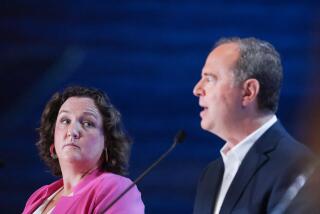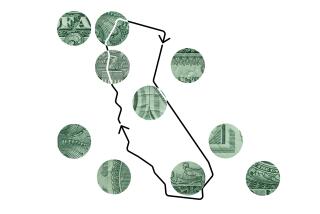Gingrich Helped Firms With Close Funding Ties : Contributions: Tax breaks, FDA action aided drug companies. Spokesmen deny any quid pro quo.
WASHINGTON — Rep. Newt Gingrich (R-Ga.) introduced legislation in 1993 proposing tax breaks for several large pharmaceutical companies that gave money to a network of fund-raising organizations tied to the congressman.
Gingrich, who was elected House Speaker last month, also pressed the Food and Drug Administration in July to expedite approval of a drug manufactured by one of the firms, Solvay Pharmaceuticals Inc. of Marietta, Ga.
Solvay is one of a number of health-related businesses that support the Progress and Freedom Foundation, a Washington think tank that finances Gingrich’s weekly college course and television show. The foundation refuses to disclose the amount of contributions it receives from individual donors, but a Solvay official said Thursday that the firm gave $30,000 last year to support a Progress and Freedom project aimed at overhauling the FDA’s drug-approval policy.
A top executive at another drug firm that stood to reap benefits from the Gingrich legislation, Marion Merrell Dow Inc. of Kansas City, donated $41,690 to the GOP Action Committee, or GOPAC, a political group headed by Gingrich that helped elect a Republican majority to Congress last fall.
Spokesmen for the drug firms and the foundation said there was no connection between the donations and any assistance provided by Gingrich.
“There is absolutely no linkage here of any sort,” said Bill Myers, foundation vice president. “There is no formal relationship between the Speaker and the foundation that would provide him any reasons to introduce legislation for one of our supporters.”
Gingrich spokesman Tony Blankley declined to answer specific questions relating to the legislation or to the intervention on Solvay’s behalf with the FDA.
The Speaker’s efforts, however, raise new questions about preferential treatment or favors for those who give large sums--often anonymously--to GOPAC or other Gingrich endeavors.
“The Speaker has various (fund-raising organizations) in which large contributions can be made to benefit things that are important to him from people who have enormous stakes in government,” said Common Cause President Fred Wertheimer, who added that such relationships merit close examination.
And on Thursday, Common Cause called on the House Ethics Committee to hire an independent adviser to examine Gingrich’s controversial book contract with HarperCollins Publishers Inc. Gingrich first negotiated and then--amid intense criticism--turned down a $4.5-million book advance from HarperCollins.
The publishing company is controlled by media magnate Rupert Murdoch, whose Fox Television Network has interests pending before the federal government. Gingrich has said he intends to submit a proposed book contract calling for a $1 advance and royalties on book sales to the ethics panel for approval.
*
Gingrich’s role as GOPAC chairman for the past decade has been the subject of recent controversy stemming from the group’s refusal to disclose the identities of most of its large donors. The committee raised more than $7 million between 1988 and 1993, much of it from corporate executives with significant interests in federal legislation, according to internal documents obtained by The Times and other news organizations.
The Progress and Freedom Foundation has solicited $1.7 million in donations from about 100 supporters, many of them large corporations such as AT&T;, Federal Express, IBM and the Coca-Cola Co. Bowing to pressure from critics, the nonprofit foundation released a list of donors in December but did not disclose how much money was given by each.
The large corporate contributions raise the potential of numerous conflicts of interest, particularly given the influence Gingrich now wields as Speaker, critics say.
During the previous two-year session of Congress, Gingrich introduced nine bills as minority whip. Although he had not established himself as a specialist in drug industry issues, three of the measures sought to exempt companies importing certain foreign-made chemicals from paying import duties on them.
Gingrich’s tariff-reduction bills were among several hundred such measures introduced by lawmakers in the 103rd Congress. The goals were generally to lower costs of goods to consumers and increase the competitiveness of U.S. firms.
In recent years, however, it has become difficult to win legislative approval for lower tariffs because lawmakers have been required to find offsetting sources of revenue under a congressionally approved plan intended to keep the federal budget deficit from growing.
“Most of the members who introduce these bills either have some producer interest in their district or have other incentives to do something for one of these industries,” said one former Clinton Administration official.
A total of 226 of these tariff measures--either eliminating or substantially reducing import duties--eventually were included in the revised General Agreement on Tariffs and Trade that was approved last year. Under the pact, all pharmaceutical duties were eliminated.
One of the chemicals cited in Gingrich’s legislation was lactulose, a liquid laxative sold by several U.S. companies. The firms included Marion Merrell Dow and Solvay--all donors to organizations affiliated with Gingrich.
Marion Merrell Dow is a subsidiary of the giant Dow Chemical Co. The firm’s general counsel, William K. Hoskins, is a charter member of GOPAC who contributed $10,000 in 1991 and 1993 and $21,690 in 1992. Gingrich’s own congressional campaign also collected $4,000 from Hoskins; $1,000 from Hoskins’ wife, Elizabeth, and $1,500 from Marion Merrell Dow’s political action committee. Hoskins did not return repeated calls for comment.
Solvay, a subsidiary of the Belgian chemical giant, Solvay S.A., with U.S. headquarters in Gingrich’s district, first contacted its congressman about the tariff exemption in May, 1993, said company Vice President Dale Hetzler. Gingrich introduced legislation in July, 1993, that would extend a previous duty exemption through 1997.
In addition, Solvay requested that Gingrich support a similar suspension of import fees on fluvoxamine maleate. The company was seeking to market the drug in the United States as Luvox, a treatment for obsessive compulsive disorder. Gingrich also submitted that exemption proposal in July, 1993.
Upjohn Co., a large Kalamazoo, Mich., pharmaceutical company, is marketing Luvox in a partnership with Solvay. Upjohn’s Employees PAC gave $2,000 to Gingrich’s campaign last year.
Within a month or so, Hetzler said, Solvay learned that the foundation was launching a research project on ways to make the FDA drug-approval process more efficient. Since Solvay had its own difficulties getting Luvox through FDA hurdles, Hetzler said, the company gave $30,000 to the foundation in January of last year.
*
Six months later, Solvay officials asked Gingrich to find out why the FDA was taking so long to approve Luvox.
Gingrich and Rep. Cass Ballenger (R-N.C.), who was contacted by a constituent whose son worked at Solvay, fired off a letter to FDA Commissioner David A. Kessler noting that the agency’s review of the Solvay product had been going on for 2 1/2 years.
“Time delays of months or even weeks are critical to a small company in this industry,” the lawmakers wrote on July 22, 1994. Solvay does $1 billion a year in business; its parent company’s annual sales reach $7 billion.
In the letter, the congressmen pointedly requested an explanation of the delays. “If indeed the delays are administrative and not substantive, we feel it is an unfortunate event for this company and for the potential patient population,” they wrote.
The company received tentative approval the following month to sell Luvox. FDA and Solvay officials said Gingrich’s action had no bearing on the decision.
The Gingrich letter, his legislation on behalf of Solvay and the company’s contributions “are completely unrelated,” Hetzler said. “As they were taking place, there was no suggestion of any connection.”
Gingrich’s letter for Solvay was not his first for a health care company that had contributed to organizations he supports.
Last fall, he sent a letter to Leon E. Panetta, President Clinton’s chief of staff, complaining about “stonewalling and needless delay” by the FDA in approving the marketing of a home AIDS test kit made by Direct Assess Diagnostics, of Rahway, N.J.
The company; its president, Elliott Millenson; and its parent company, Johnson & Johnson, all donated to the Progress and Freedom Foundation in the last two years.
Times staff writers Michael Ross and Marlene Cimons and researchers Murielle Gamache and Pat Welch in Washington and researcher Edith Stanley in Atlanta contributed to this story.
More to Read
Get the L.A. Times Politics newsletter
Deeply reported insights into legislation, politics and policy from Sacramento, Washington and beyond. In your inbox three times per week.
You may occasionally receive promotional content from the Los Angeles Times.










